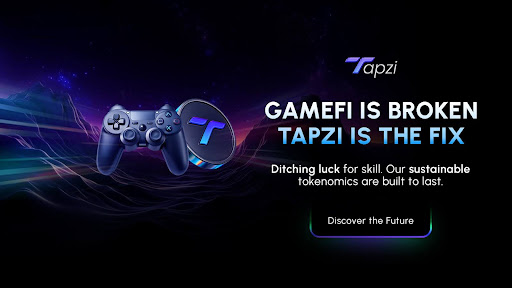Tapzi’s Skill-Based Gaming Might Bring More Attention to Blockchain Games

DappRadar recently revealed a harrowing state of blockchain gaming in 2025. According to the popular publication, activity within the decentralized gaming sector has dropped by 17% QoQ, which is the lowest since 2023. This has been the result of over 300 gaming dApps going inactive in the first quarter of this year alone.
The state of blockchain gaming could be changed if there is a project that can deliver something different and more unique. A project that understands the technological limitations of blockchain technology but still leverages its best parts to provide a robust gaming experience.
One of the leading projects that has been trying to accomplish this is Tapzi.
Currently in presale, Tapzi’s native crypto has raised upwards of $26 million already. With its more nostalgic and simplified approach to introducing its games, there is hope among the community that it could reinvigorate this sector, which seems like it is on its last legs.
Bad State of Blockchain Gaming in 2025: Exploring the Core Reasons
The reason for the bad state of blockchain gaming essentially comes down to three core reasons:
Game Design is Poor and Tokenomics is Unsustainable
The emphasis on earning over enjoyment has pushed over 60% of gamers out of the blockchain gaming space. There are no long-term incentives present. And to add insult to injury, the games’ “play to earn model” often relies on speculative behaviour and grind, rather than actual skill.
This has overshadowed the core gaming experience, leading to the current state of blockchain gaming.
Complex Onboarding Setups and Purist Behaviour
Since blockchain technology is new and the games that have historically been deemed successful are old school, there has been a “purist” attitude towards blockchain games. The current fans of such ecosystems vehemently deny anything wrong with the ecosystem, leading to the same complex UI that makes onboarding difficult.
And the same purist behaviour also looks down on the traditional form of gaming, where fun and gameplay are the factors, which has further given blockchain games a bad reputation.
Lack of Skill-Based Gameplay Approach and Overpromising
This drawback is the extension of poor game design. Games have shallow mechanics, and some of the ones that the existing crowd looks out for are even idle games. With no skill being utilized, gamers aren’t enticed to stick around a project for long.
And then there is overpromising. There have been many broken AAA metaverses with “next-gen ecosystems” that have fallen flat on their face shortly after release. This overpromising/underdelivery cycle is getting old, prompting users to look elsewhere.
How Tapzi Fixes These Shortfalls to Provide a New Era of Blockchain Gaming
If there is one term that could define how Tapzi addresses the existing drawbacks of blockchain gaming to provide users with something new, it is this: “sticking to the basics.”
Sticking to Old-School Nostalgic Games with a Competitive Core
Tapzi is presenting itself as the world’s first decentralized, skill-based Web3 gaming platform. While the name is a mouthful, none of the games it has highlighted are overpromises. It trades off the hype-driven “next gen” games for simple game offerings.
The top games that have been the highlight of this project so far include Checkers, Tic-Tac-Toe, and Rock Paper Scissors. Even Chess is included here.
This approach creates a foundation for a competitive environment to take hold, ensuring that the blockchain ecosystem is bolstered. With time, the idea is to create global competitions using these titles, with competitive gamers from the USA, UK, Germany, South Korea, and more coming to participate.
There are plans for ranked tournaments as well as leaderboards that drive regular community engagement.
An extension to this utility is the Tapzi launchpad, which will provide developers with a simple SDK to create and integrate their own games within the ecosystem. So, with time, old and cultural hits like Checkers and Shogi could make their way onto Tapzi. The developers will also be compensated, as they will earn revenue from in-game activities.
These two factors turn the standard “play-to-earn” narrative into “skill-to-earn,” bringing real competition and fun into the blockchain gaming ecosystem.
Simplified UI and Device Support
Realizing that isolating the real gamers of the Web2 space has been the reason for the decline of blockchain gaming, Tapzi has taken a more robust, cross-platform approach. It removes all app requirements or downloads and simply gives users access to the games via the website.
The games provided have two versions by necessity. For those who only seek gaming and don’t want anything to do with the earning mechanics, standard gaming is allowed through the web browser.
But those who want to interact with the earning mechanics of the ecosystem can connect their wallets to the site and start playing. The gameplay approach will be the same, with Web3 players only getting the advantage of earning and participating in Tapzi’s in-game staking and receiving the perks involved with it.
Strictly PVP and Fair Gaming for All
Tapzi’s core focus is to strictly push towards PVP gaming. There are no AI bots available, which means single-player options aren’t there, and everything will be about one human battling another. This strict multiplayer approach will keep the games fair and fun.
The Verdict: Tapzi Could Bring More Competition into Blockchain Gaming
Tapzi has emerged with an approach to gaming that should not be so unique, but it is. It is game-centric, with an ecosystem revolving around players being able to compete to earn rather than fueling an underlying DeFi ecosystem that turns wins into speculative returns. With its presale having raised over $26 million already, it is shaping up to be a project that could stand strong and bring a new and improved era of blockchain gaming.







